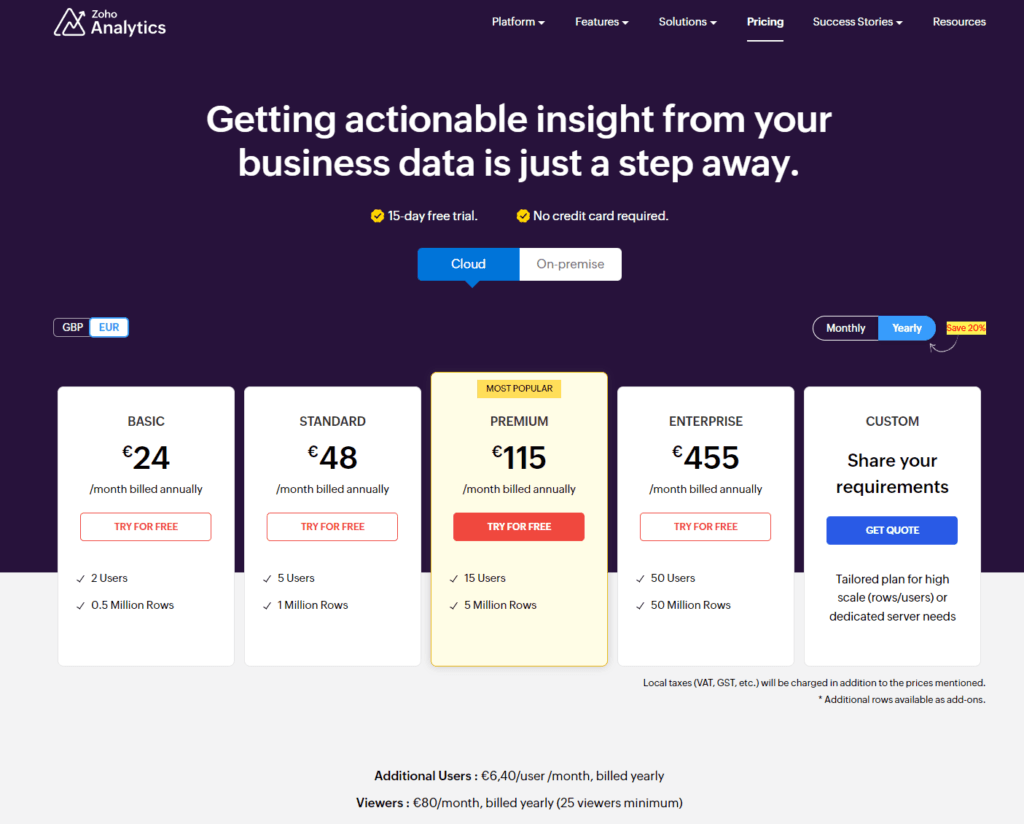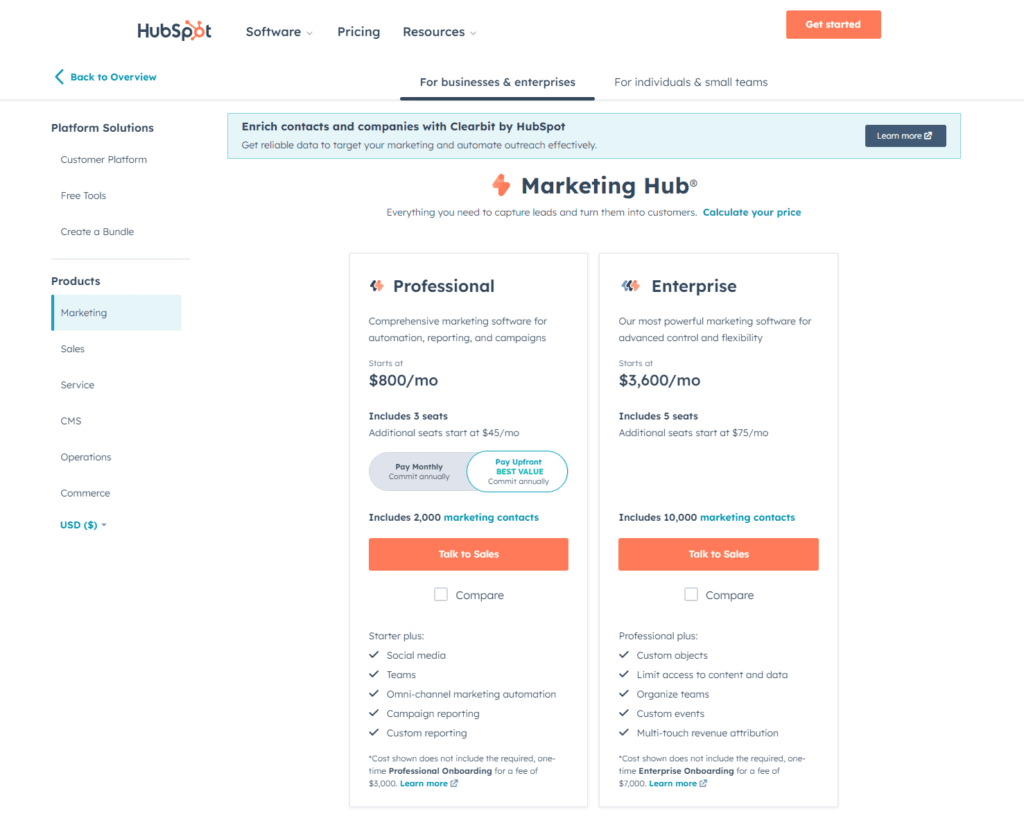In the labyrinth of data analytics, where every turn and corner presents new challenges and opportunities, two tools stand out as beacons for businesses seeking clarity: Zoho Analytics and HubSpot Marketing Analytics. One, a comprehensive suite designed to illuminate the vast expanse of business data with precision and flexibility. The other, a specialized torchbearer focused on guiding the way through the nuances of marketing performance. But which will light the path to actionable insights for your business? Whether you’re delving into the depths of company-wide data or honing in on marketing metrics, this guide embarks on a journey to discover “The Best Analytics Tool for You.”
| Zoho Analytics | HubSpot Marketing Analytics |
|---|---|
 |  |
| G2 Score -4.3 out of 5 | G2 Score -4.4 out of 5 |
| TrustRadius Score -8.1 out of 10 | TrustRadius Score -8.5 out of 10 |
Area of Comparison: Integration Capabilities
Zoho Analytics: The Data Aggregator
Zoho Analytics emerges as a versatile aggregator in the realm of data analytics, boasting extensive integration capabilities that span a wide array of data sources. Its power lies in its ability to seamlessly merge information from various feeds – from internal databases and spreadsheets to cloud services and external applications. This breadth of integration ensures businesses can construct a holistic view of their operations, drawing insights from every corner of their data landscape.
The platform simplifies the complex task of data consolidation, offering users a unified analytics environment where disparate data streams become coherent insights. With Zoho Analytics, businesses have the flexibility to explore comprehensive analytics without the confines of data silos, making it an invaluable ally for those looking to leverage data from across their entire organization.
HubSpot Marketing Analytics: The Marketing Maestro
HubSpot Marketing Analytics, on the other hand, specializes in shining a light on marketing data, providing a focused lens through which businesses can gauge their marketing efforts. Its strength lies in its native integration with the HubSpot ecosystem, ensuring a seamless flow of marketing data from HubSpot’s CRM, email, social media, and advertising tools.
This specialization extends to integrations with external platforms, enabling marketers to pull in data from various marketing channels into a centralized analytics dashboard. HubSpot Marketing Analytics is tailored for marketers seeking to understand and optimize their campaigns in real-time, offering insights into website traffic, lead generation, email marketing performance, and more.
Pricing: Zoho Analytics vs HubSpot Marketing Analytics
Advancing to a crucial aspect that greatly influences the decision-making process for any organization, let’s explore the Pricing models of Zoho Analytics and HubSpot Marketing Analytics. Understanding the cost structure and what each platform offers at various price points can help businesses assess which tool provides the best value for their investment.
Zoho Analytics: Flexible and Scalable Pricing

Zoho Analytics is recognized for its transparent and scalable pricing model, designed to cater to businesses of all sizes. The platform offers a range of pricing tiers, starting with a free version that supports basic analytics needs for small teams or individuals. From there, pricing scales up based on the number of users, the volume of data processed, and access to advanced features. Each tier is clearly outlined, providing businesses with the ability to predict costs and scale their analytics capabilities as they grow.
This flexible approach allows organizations to start small and expand their use of Zoho Analytics without encountering unexpected expenses. Additionally, Zoho offers annual billing options, which can provide cost savings over month-to-month payments, further enhancing its appeal to budget-conscious businesses.
HubSpot Marketing Analytics: Integrated Value

HubSpot Marketing Analytics is part of the broader HubSpot ecosystem, and its pricing is intertwined with the HubSpot Marketing Hub packages. While this means that the analytics capabilities are not priced separately, businesses can access a suite of marketing tools along with analytics features, providing integrated value. HubSpot’s pricing tiers are designed to support growing businesses, from free tools for startups to more advanced packages for enterprises.
The integrated approach means that businesses looking to utilize HubSpot Marketing Analytics will be investing in a comprehensive marketing platform. This can be highly advantageous for organizations that wish to consolidate their marketing activities and analytics within a single ecosystem. However, for those specifically looking for standalone analytics capabilities, the pricing may require a broader investment in HubSpot’s suite.
User Interface and Accessibility
Continuing our exploration into the realm of analytics tools, let’s pivot to a crucial aspect that significantly influences user adoption and overall satisfaction: User Interface (UI) and Accessibility. A tool’s UI plays a pivotal role in how intuitively users can navigate through complex data and derive actionable insights. Here’s how Zoho Analytics and HubSpot Marketing Analytics stack up in offering users a seamless and productive experience.
Zoho Analytics: The Intuitive Explorer
Zoho Analytics is designed with the ethos of making data analytics accessible to users of all expertise levels. Its user interface is a testament to this philosophy, offering an intuitive, clean layout that simplifies the journey from data to insights. With drag-and-drop functionality, users can easily create custom reports and dashboards without deep technical know-how. This ease of use extends to its visualization capabilities, allowing for the creation of compelling data presentations that can illuminate insights at a glance.
Moreover, Zoho Analytics provides a mobile application that ensures accessibility on the go, enabling decision-makers to stay informed with real-time data, no matter where they are. This combination of intuitive design, ease of use, and mobile accessibility makes Zoho Analytics a powerful tool for businesses seeking to democratize data analytics across their teams.
HubSpot Marketing Analytics: The Focused Navigator
HubSpot Marketing Analytics, tailored specifically for marketing data, offers a user interface that is both sleek and focused. The platform is designed to present marketing metrics in an easily digestible format, enabling marketers to quickly gauge the effectiveness of their campaigns across various channels. The dashboard and reporting tools are streamlined to highlight key performance indicators (KPIs), from website traffic to lead conversion rates, ensuring that critical data is front and center.
The integration within the HubSpot ecosystem also means that data from CRM, email, social media, and advertising channels is seamlessly consolidated, providing a unified view of marketing performance. This focus on marketing analytics, combined with a user-friendly interface, makes HubSpot Marketing Analytics an invaluable tool for marketing teams looking to optimize their strategies based on solid data insights.

Related: Check out our free SEO suite

Advanced Analytics and Machine Learning Capabilities
Continuing our journey through the analytics landscape, let’s explore an aspect that’s increasingly becoming a deal-breaker for many businesses: Advanced Analytics and Machine Learning Capabilities. In a world awash with data, the ability to not only interpret but also predict future trends and behaviors can set a platform apart. Here’s how Zoho Analytics and HubSpot Marketing Analytics stack up when it comes to empowering users with forward-looking insights.
Zoho Analytics: The Predictive Powerhouse
Zoho Analytics steps up as a predictive powerhouse, offering a suite of advanced analytics and machine learning features designed to unearth deeper insights and forecast future trends. With built-in predictive modeling, users can explore scenarios and make predictions based on their data, turning raw numbers into strategic foresight. Zoho Analytics also allows for the creation of custom machine learning models, offering a sandbox for data scientists to experiment and deploy their algorithms.
The platform’s AI assistant, Zia, further simplifies the interaction with complex data sets, enabling users to ask questions in natural language and receive insightful answers. This blend of advanced capabilities and user-friendly tools makes Zoho Analytics a compelling choice for businesses looking to leverage data for strategic advantage.
HubSpot Marketing Analytics: The Insightful Optimizer
While HubSpot Marketing Analytics might not offer the same breadth of predictive analytics as Zoho Analytics, it excels in providing actionable insights that can directly impact marketing strategies. The platform utilizes data from its comprehensive suite of marketing tools to offer detailed performance analytics, helping users identify successful campaigns, optimize conversion paths, and understand customer behavior patterns.
HubSpot’s strength lies in its ability to deliver these insights within the context of marketing activities, making it possible for marketers to quickly adjust tactics and strategies based on real-time data. While it may lean more towards descriptive analytics, HubSpot Marketing Analytics offers enough depth to inform decision-making and strategy optimization, particularly for marketing-focused users.
Customization
Customization can span from the ability to tailor dashboards and reports to the flexibility of integrating custom data sources or embedding analytics into existing applications. Here’s a conceptual look at how Zoho Analytics and HubSpot Marketing Analytics might compare in this key area.
Customization in Zoho Analytics
Zoho Analytics stands out for its extensive customization capabilities, designed to cater to a wide variety of business needs and preferences. It allows users to design dashboards that combine a variety of visualization types, from charts to KPI widgets, tailored to specific audience needs. Advanced users can manipulate data models, creating custom fields and formulas to analyze data in ways that align with their business logic.
Zoho Analytics offers APIs for integrating with other applications and services, as well as embedding options to place analytics directly within internal or customer-facing apps. For businesses looking to offer analytics as part of their product offering, Zoho provides white-label capabilities, allowing for the rebranding of the analytics platform. These features make Zoho Analytics a highly adaptable tool that can be molded to fit the specific reporting and analytical needs of a business, making data insights both accessible and actionable across the organization.
Customization in HubSpot Marketing Analytics
HubSpot Marketing Analytics, while more focused in its scope, offers customization features that are particularly valuable for marketing teams. Users can create dashboards that highlight the marketing metrics most relevant to their goals, from website traffic and lead generation to email campaign performance.
HubSpot allows users to build custom reports that combine data from various HubSpot tools (CRM, email, social media, etc.), enabling deep dives into marketing performance. Through HubSpot’s App Marketplace, users can integrate data from a variety of third-party tools, enriching the marketing data ecosystem within HubSpot.
While not customization in the traditional sense, HubSpot’s powerful automation tools allow for highly personalized marketing actions based on data insights, enhancing the impact of analytics on marketing strategy. HubSpot Marketing Analytics excels in providing marketing-focused customization, enabling teams to tailor their analytics environment to their specific strategies and campaigns, thereby maximizing the effectiveness of their marketing efforts.
Conclusion
Concluding our detailed exploration of Zoho Analytics and HubSpot Marketing Analytics, we’ve journeyed through the pivotal aspects that set these platforms apart. From their data integration capabilities and user interfaces to advanced analytics, pricing models, and customization features, it’s evident that each tool caters to distinct needs and preferences within the analytics domain.
Embarking on this comparative journey between Zoho Analytics and HubSpot Marketing Analytics aimed to illuminate the unique paths each platform offers businesses navigating the complex waters of data analytics. As you stand at the crossroads, ready to choose the analytics tool that will best serve your organization’s journey, remember that the most effective choice is the one that aligns with your unique challenges, aspirations, and strategic vision.
READ NEXT:
- Zoho Analytics vs Amplitude: The Best Analytics Tool for You
- Segment vs Optimizely: The Best Analytics Tool for You
- 51+ Outstanding Email Marketing Tools to Skyrocket ROI
- MicroStrategy vs Heap: The Best Analytics Tool for You
- How to Hire the Best SEO Services: Industry Review
- 11 Marketing Analytics Tools to Elevate Your Data-Driven Strategies
- 29+ Digital Analytics Software to Skyrocket Your Digital ROI






















Comments are closed.